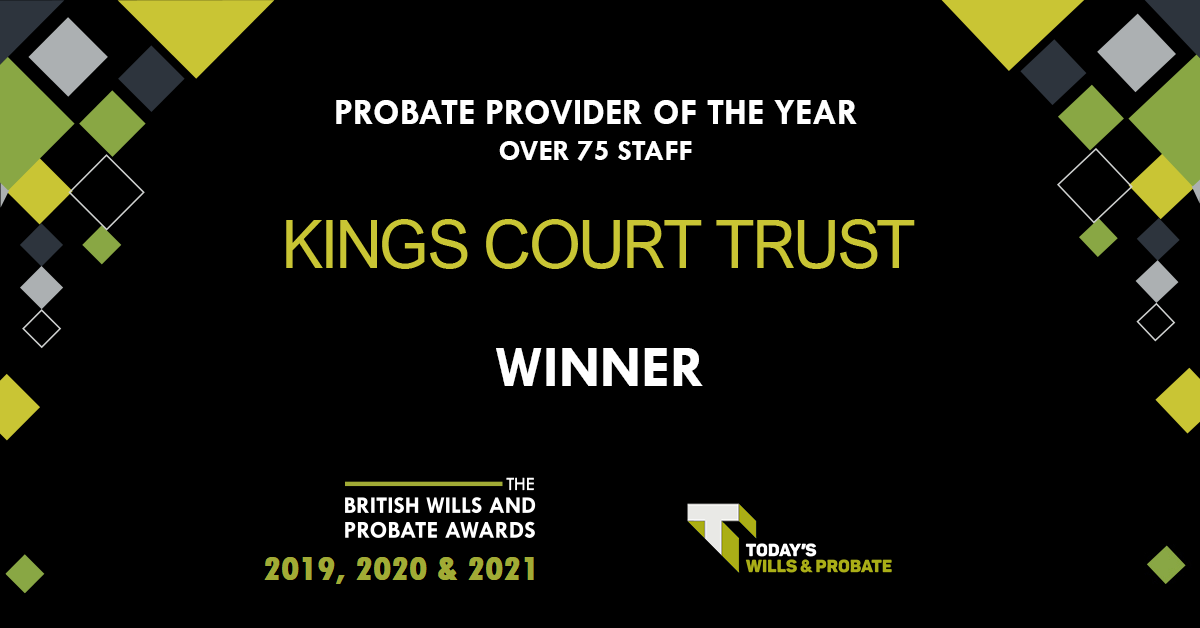Are you handling the affairs of someone who has passed away and need help understanding the probate process? Read on for our detailed probate guide covering all of the commonly asked questions.
The term ‘probate’ refers to the Grant of Probate, which is a legal document that Executors may need to obtain when administering the estate of someone who has passed away. This process is referred to as ‘Confirmation’ in Scotland.
A Grant of Probate provides the Executor with the legal authority to carry out estate administration, which includes dealing with all of the deceased’s assets, legal affairs, debts, and more. Therefore, probate is one part of the wider estate administration process; the term is commonly misused by many to refer to the entire process of dealing with the estate of someone who has passed away. Whilst probate isn’t always required, an estate must always be administered.
Whether or not probate is required does not depend on whether there’s a Will or not. Probate is usually required if the deceased owned assets or property in their sole name. In this case, a Grant of Probate is often needed in order to sell or transfer the property and release funds to the beneficiaries of the estate. However, if assets were held jointly, they will automatically pass to the surviving joint owner. Additionally, a Grant of Probate may not be required if:
This depends entirely on the financial institution that the deceased held money with.
The probate threshold is independent to the bank or building society, and it is subject to change by each individual institution.
Typically, the probate threshold will vary from £5,000 to £50,000, although some banks will decide on a case-by-case basis. It is best practice to check whether you need probate to access funds with the relevant financial institution at the time.
The set government fee for applying for a Grant of Probate in England and Wales is £273 for estates over £5,000.
For estates valued at £5,000 or less, there is no fee to pay. Within this £273 fee, you will receive one copy of the Grant, but it is recommended that you purchase more at the time of application for a small fee.
Additionally, if you choose to instruct a professional to apply for probate on your behalf, there will be additional fees to pay, but these vary between each provider. It’s worth obtaining multiple quotes so that you can compare them and ensure that the fee is fixed to avoid any unexpected costs.
You should receive the Grant of Probate within 16 weeks of submitting an application (according to GOV.UK as of 5th June 2022).
However, this time can be increased by errors on the application (a ‘stopped’ Grant) or delays from HM Courts and Tribunals Service (HMCTS). Professional providers are finding that Grants are often taking longer than 16 weeks as suggested by GOV.UK. Generally, it is quicker to apply for probate digitally rather than via a paper application, but in order to do this it must comply with HMCTS' rules for digital application.
Related content:
When the deceased has left a Will, they should have appointed an Executor to administer the estate, including obtaining probate (if required). There may be more than one Executor administering the same estate, but only one needs to apply for the Grant. The other Executors will have ‘power reserved’, which means that they remain as Executors but do not need to be involved with the probate process unless they wish to. Alternatively, they can renounce their position if they do not want to be involved at all.
If there is no Will, an Administrator will be appointed according to the rules of intestacy. This is usually the next of kin.
The umbrella term for an Executor or Administrator is ‘Personal Representative’. An Administrator has the same role as an Executor, but they will need to apply for Letters of Administration rather than a Grant of Probate. Both documents grant the same legal responsibility to administer the estate.
Yes, the Executor of a Will can be a beneficiary of the estate; it’s very common for the lead Executor to be the main beneficiary, in fact. However, it’s also acceptable to choose someone who is not benefiting from your Will to be the Executor of your estate.
Related content:
There is no official time limit in place for how quickly you should apply for probate after a death. However, it’s best to start the process as soon as possible, as this will enable you to begin administering the estate, which could help avoid complaints from beneficiaries that the distribution is taking too long. In some cases, claims could be made against the estate, and the Executor is personally liable for this. Additionally, if Inheritance Tax is payable, it is advisable to pay it by the end of the sixth month after the person's death to avoid interest charges. Inheritance Tax forms must be submitted before probate can be granted.
First, the death must be registered. Then, all assets and liabilities within the estate should be detailed so that the value can be calculated. If the estate includes a property, this must also be valued, and any gifts made by the deceased should be included in the value of the estate for Inheritance Tax purposes (if applicable). At this point, a Grant of Probate application can be submitted to the Probate Registry.
To apply for a Grant of Probate, you will need:
.png?width=64&height=64&name=notary%20(1).png)
A PA1P (if there is a Will) or PA1A (if there is no Will)
.png?width=64&height=64&name=tax%20(5).png)
An Inheritance Tax form
This may not be needed if the estate is low value or meets the excepted estate requirements.

A copy of the death certificate
-1.png?width=60&height=64&name=last-will%20(2)-1.png)
The original Will and any codicils
This details any additional changes to the original Will.

Photographic ID
The court will not issue a Grant of Probate until HMCTS confirms that the Inheritance Tax has been paid (if necessary). There will be no interest on the Inheritance Tax bill until six months after the death; therefore, although there is no deadline for when probate should be applied for, Executors should ensure any Inheritance Tax payable is dealt with sooner rather than later to avoid additional tax.
The estate should not usually be paid out until the Executor has a Grant of Probate and all other necessary tasks have been completed to ensure accurate distribution of the correct assets.
However, if probate is not required, paying beneficiaries should still be one of the last tasks undertaken so that all debts and liabilities can be paid from the estate initially.
It is usually possible to pay the funeral bill from the estate before probate is granted, but if complexities arise, the fee can typically be reimbursed from the estate at a later date.
You may be able to sell a property before probate is granted. However, this is dependent on how the property is owned:
You should acquire a copy of the Grant for each financial institution that the deceased held funds with; multiple institutions may need to see it at once.
At the time of application, extra copies of the Grant of Probate can be purchased for £1.50 each. If you need to apply again after probate has been granted, there will be a £20 fee. This is rare but may happen if one of the Executors who holds power reserved decides to apply for probate themselves.
Whilst it’s recommended to get professional legal advice, this doesn’t necessarily have to be from a Probate Solicitor. Some Solicitors only deal with a small number of estates as part of their varied practice, so they may not possess the specialist knowledge acquired through dealing with large numbers of probate and estate administration matters. There are many professional providers that can complete the probate application process on your behalf; this can help give you peace of mind that everything is being taken care of, and some of the liability is taken off your hands.
When instructing professional help, it's highly advisable to source a regulated provider; Solicitors (regulated by the Solicitors Regulation Authority) are just one type of regulated legal services provider. At Kings Court Trust, we are licensed by the Institute of Chartered Accountants in England and Wales, who ensure client protection and the provision of a high-quality professional service to legal services customers.
Alternatively, the Executor can also choose to deal with the probate process themselves, but they should expect a complicated legal process that may require a lot of time and extensive paperwork.
Related content:
Probate Solicitors’ fees are sometimes calculated from a percentage of the estate, generally between 1-5% plus VAT and the probate fee. Other Solicitors may charge an hourly rate, meaning that you only pay for the work that is completed. This can be more difficult to predict, as unexpected delays could mean your fee increases. Some may charge a fixed fee that varies depending on the estate’s size and complexity.
When comparing probate fees between Solicitors and other specialist providers, make sure to check what’s included in each quote and whether there is a breakdown of third-party costs. There is no obligation to use a Solicitor for probate even if they were involved with making the Will.
Due to the various charging methods on the market, it’s difficult to provide a comparison of the likely fees. At Kings Court Trust, we only work on fixed fees for our award-winning probate services; this ranges from £995 to £1,995 (excluding VAT and the probate fee), depending on the level of control the Personal Representative wishes to retain. Alternatively, we can take care of the full estate administration process, including applying for a Grant of Probate. Typically, our average fees are as follows:
Please note that the above quotes are exclusive of VAT and third-party costs (sometimes called “disbursements”). We will provide you with a bespoke quote at the appropriate time based on the complexity of the estate administration and legal work involved.
Related content:
The Probate Registry will be in possession of the original Will after probate has been applied for.
Once the Will has been registered with the Probate Registry, it is officially a public document that anyone can apply for a copy of through probate records. If probate isn’t required, the Will remains in possession of the Executor and will not be made public.
Includes collecting in and distributing up to three assets, or transferring them to up to two beneficiaries. An asset does not include property.
£1,495 (excluding VAT & probate fee)
Learn more1. Grant and transfer of property
2. Grant and Trust of property
3. Grant and Nil Rate Band Discretionary Trust
Each option has a fee of £1,995 (excluding VAT & probate fee)
Learn moreWe will complete the full process of estate administration taking on the legal and financial responsibility to do this. From dealing with all assets (such as property, shares, and personal possessions), paying debts, paying any Inheritance Tax and Income Tax, and transferring inheritance to the beneficiaries of the estate.
From £2,340 (excluding VAT
& third-party costs)


